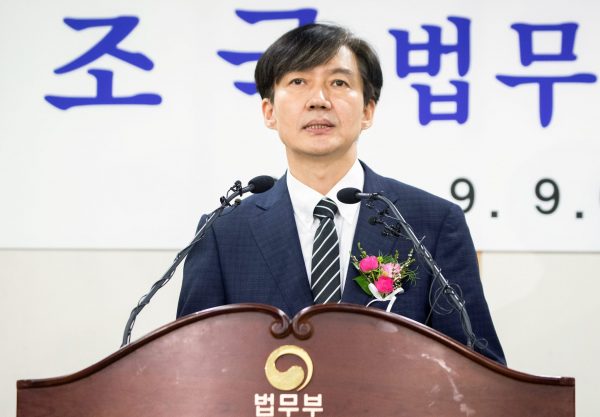This political chaos exposes not only Cho and his family’s abuse of their high-profile social status amid the worsening class divisions in today’s South Korean society, but also the self-righteous politics of Moon’s ‘candlelight government’. A survey by pollster Korea Research International reveals that the country is split — 57.1 per cent said Cho’s appointment was wrong while 36.3 per cent approved.
Young South Koreans are particularly outraged by Cho’s daughter’s unlawful academic privileges. As a high school student, Cho’s daughter was credited as the lead author of a medical research paper published in the Korea Journal of Pathology in 2009. The paper was submitted as part of her application to the prestigious Korea University, where she obtained her undergraduate degree. As a medical student at Pusan National University, she also received scholarships totalling 12 million South Korean won (US$10,000) despite having twice failed her exams.
Student councils at Seoul National University and Korea University, among others, staged candlelight vigils in protest against Cho’s appointment, declaring that for a man with allegations of misconduct and corruption to become Justice Minister is ‘a complete betrayal of equality and justice’. A newly formed group of 4366 former and current professors from 299 academic institutions signed their public statement — declared for the second time, in front of the Blue House, on 27 September — demanding ‘a new appointment, instead of Cho, who can establish social justice and morality’.
Separately, more than 2000 medical doctors and some 800 lawyers also signed a petition urging Cho’s resignation, affecting Moon’s approval ratings. According to a recent Gallop Korea poll, this rating dipped to 40 per cent — the lowest since he took office.
Cho is arguably South Korea’s most outspoken left-wing intellectual turned political elite, having built his reputation as a crusader of progressive values — particularly through his criticism of ‘unfair customs of society and the establishment’. When he was senior secretary to the President for civil affairs, Cho led the Moon administration’s anti-corruption reform of the so-called ‘accumulated old evils’ by helping to ensure the imprisonment of two former presidents, Park Geun-hye and Lee Myung-bak, and the investigation of 120 former officials.
Cho also played a significant role in popularising anti-conservative public sentiment, especially through promoting the phrase Hell Joseon (Hell Korea) to which he equated the youth exploitation system of modern South Korea’s winner-take-all society where the majority of young people struggle against their collective sense of hopelessness. The popular notion of ‘Hell Korea’, especially endemic among the young people, helped trigger the candlelight protests against Park whose ousting on charges of corruption and abuse of power opened the door for Moon’s rise to the presidency in 2017.
Ironically, the popular protest slogan, ‘Is this called a country?’ that originally mocked the right-wing conservative Park administration is now being pointed at the left-wing progressive Moon and his ruling Democratic Party. Moon appears to listen to no one but his inner circle, ignoring outcries. In announcing Cho’s appointment, Moon said, ‘the more reform-minded a candidate, the more he or she faces a tough time in the confirmation hearings’, suggesting that anyone who opposes Cho’s appointment is also against his reform drive.
The problem with Moon’s unilateralism, as shown in Cho’s appointment, is that it not only contradicts his government’s core values of what Moon himself called equal opportunities, fair process and just outcomes, but also accelerates a new level of self-righteous politics in his administration. Lee Hae-chan, leader of the ruling Democratic Party, condemned the prosecutor’s investigation of the Cho Kuk scandals as ‘disturbing the nation’. Other lawmakers within the party accused the investigation of being ‘an undemocratic act to restrict presidential authority’ and ‘misjudged behaviour by the politically motivated prosecution to protect its vested interests’.
Tensions between Moon’s Blue House together with Cho’s Ministry of Justice (MOJ) on the one hand and the prosecution on the other appeared to have reached a critical point. Two senior MOJ officials reportedly attempted to obstruct Prosecutor General Yoon Seok-youl’s investigation into the Cho scandals by proposing the exclusion of Yoon from the investigation. The probe into the Cho family’s dubious investments in a private equity fund have nevertheless resulted in the arrest of Cho’s nephew, as well as a raid on Cho’s home in an unprecedented move to uncover evidence of the involvement of Cho’s wife — herself a professor.
Given that Moon and the Democratic Party’s political survival depends on the outcome of the April 2020 general elections, a push for judiciary reform through Cho may have been a calculated strategy. But Moon, like many members of his ruling Party who have publicly shown their approval for Cho, now needs to seriously worry about declining approval.
Ironically, Moon’s public warning to the prosecution over its ‘excessive’ probe into corruption allegations involving Cho and his family shows how his out of touch connection with the public closely resembles characteristics of Park Guen-hye in the last phase of her presidency. The political chaos brought about by Cho’s appointment inevitably further weakens Moon’s already feeble national management.
Hyung-A Kim is Associate Professor of Korean politics at the School of Culture, History and Language, The Australian National University.

